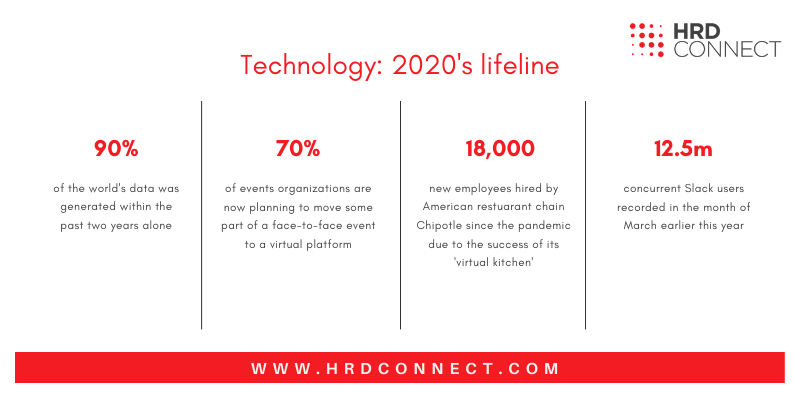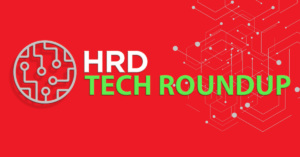HRD Deep Dive: Business and HR technology in 2020
- 6 Min Read
The pandemic has ruptured the business world to its core and forced organizations around the world to rethink. However, business and HR technology has proven to be the lifeline that many industries needed. With this in mind, we took a closer look at some of the top use cases for tech and AI in 2020 and beyond.
- Author: Sam Alberti
- Date published: Sep 4, 2020
- Categories

Ever since the development of basic concepts such as irrigation and agriculture thousands of years ago, the advancement of technology has continued to barrel along at a dizzying pace.
From the very first steam engine in 1765, to the invention of the carbon-filament light bulb in 1879, to the first airplane flight in 1903, the history of humankind is punctuated with a seemingly endless catalog of groundbreaking discoveries.
However, it’s fair to suggest that many would not have anticipated the lofty height of today’s innovation, and the rate at which technology is now advancing.
For instance, studies in 2019 suggested that 90% of the world’s data was generated within the previous two years alone. It is also estimated that Google now processes more than 40,000 queries every second.
But never has the advancement of technology felt so crucial as in 2020. Our innovations in areas such as medicine and machine learning have spared us from total devastation, and this applies to the business world as much as anything else.
Here is our overview of the key business use cases for technology in 2020 and beyond, as organizations attempt to overcome disruption and ensure continuity.
Communications technology
When it comes to businesses navigating through the pandemic, our ability to communicate on such an intimate level without being co-located is nothing short of vital.
First and foremost, this allows many organizations to continue their daily operations, work in teams, and conduct meetings regardless of where employees are located. Tools such as Slack have been instrumental in enabling this – the platform’s number of concurrent users surged from 10 to million to 12.5 million in the space of just 15 days in March earlier this year.
However, the benefits of communications technology can stretch far beyond this, and talent acquisition is an area that stands out in this regard.
For instance, in a climate where hiring has become a significantly challenging task, organizations can now enjoy the benefit of a much broader talent pool, with technology allowing for a more distributed workforce.
Not only will this make for more available candidates, but candidates are also more likely to be swayed by the prospect of being offered total geographical autonomy in their role.
In fact, a 2019 study found that 83% of global respondents said the ability to work flexibly would be the deciding factor between two similar job offers, and 32% stated that having a choice of work location would matter more to them than being given a more prestigious role.
Onboarding is another major factor here. This is a process that can be long, complicated and costly, and many perceive it to be art. It would make sense to presume that this process would be hindered without co-location, but the reality is that technology makes it possible.
Now, organizations can fashion engaging, immersive and comprehensive onboarding experiences using methods such as pre-recorded instructional videos, buddy systems, digital welcome packs, and a series of virtual ice-breaker and meet-and-greet sessions in addition to generally heightened communication.

Cost reduction
One of the most obvious by-products of a global pandemic is always going to be a sharp drop in spending and damage to industry as a result. This is undoubtedly the most prominent challenge that organizations are attempting to overcome in 2020.
However, this is another area that can, to an extent, be remedied by technology.
Once again, the ability for many of the world’s employees to perform at full capacity from their own homes is a major factor here, and myriad research can be used to support this.
For instance, one study estimates that workplace stress costs the U.S economy $500bn each year. Another found that in high-pressure firms, healthcare costs are 50% higher than others.
What’s the significance of this? Well, studies have also found that remote working is beneficial for health, with one showing that 60% of respondents reported and improvement in mental health.
If organizations can correctly leverage technologies in order to provide the workforce with an appropriate home working environment, the literature suggest that this will reflect in productivity and turnover.
A similar principle applies to presenteeism: a phenomenon that is estimated to cost a total of $150 in the United States each year. And what’s more, studies suggest that remote working could have a positive effect on productivity, with one showing that remote employees worked the equivalent of 1.4 days more each month than their office-based counterparts.
Not only are these costs that can now be avoided, but they are also costs that tend to remain hidden and slip under the radar of organizations.
Finally, there is of course scope for organizations to cut costs when it comes to more obvious overheads. The most significant example of this is the cost of hiring employees. Research by Gartner has found that artificial intelligence will eliminate 1.8 million jobs in 2020 alone.
Though the human touch will still always be needed in many ways (a debate that continues to rage on), there are instances where this could provide a useful opportunity for organizations during this difficult financial period.
Cost reduction (less offices/office benefits, less absence/sickness/presenteeism, happier employees, technologies that allow jobs to be replaced through automation)
An opportunity to pivot
HRD Connect attended a webinar with Slack co-founder and CEO Stewart Butterfield in August earlier this year. In a wry, tongue-in-cheek manner, he said: “Never waste a crisis.”
Though this must be taken with a pinch of salt, this is in many ways poignant advice for organizations in 2020. With the technology we have at our fingertips, organizations have the opportunity to respond to the changing times by redesigning and even completely reinventing products to become more digitally oriented.
The events industry, for instance, was one of the hardest hit as as a result of COVID-19. It has even been estimated that as many as 600,000 job losses in the UK industry could result.
However, remarkably, the events industry now appears to be leading the charge in pivoting and returning to work. Studies are now showing that 70% are planning to move some parts of a face-to-face event to a virtual platform.
And it shows. Countless organizations are now pivoting their approach and shifting to digital events and conferences, and Spotify is even reportedly working on a virtual events integration feature in aid of the major landscape change.
Online rental marketplace Airbnb are another fantastic example of an organization that is rolling with the times and using digital tools to ensure continuity and growth.
In response to the pandemic, the California-based company moved swiftly to help its hosts connect with prospective guests. Hosts now have the ability to hold online sessions focused on areas such as cooking, meditation and various other activities for a small fee.
American restaurant chain Chipotle also took matters into its own hands during the pandemic and used a virtual platform to pivot the business. In response to social distancing and health and safety regulations, it launched its very own ‘digital kitchen’.
The success of the maneuver was such that the organization has hired 18,000 more employees since the onset of the pandemic.







